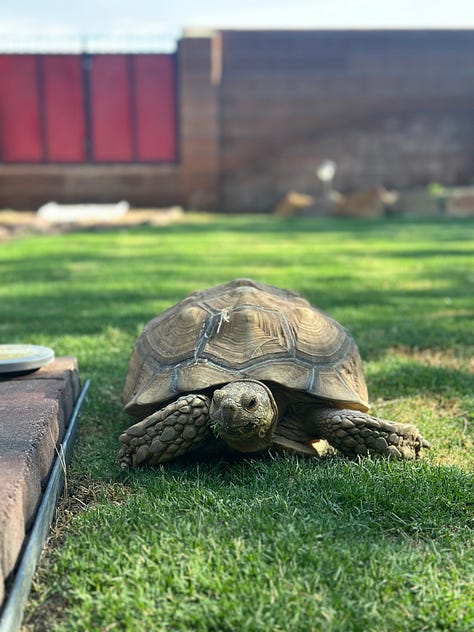The Tortoise and the Tone
And that’s when I realized—Tori might be the one family member who gets me. Sometimes, a little hiss isn’t a sign of personal attack or mean-spiritedness. It’s just the way we’re built.
Last month, I finally met Tori, the Tortoise, during a visit to my Oma and Uncle S’s home in NM. Tori, who technically belongs to my Uncle's friend, is luxuriating in their backyard for an indefinite stay. Tori is 10. My understanding is that my Uncle's friend rescued her from a family member who kept her in a dark basement. It sounds like something PETA would disapprove of, but honestly, no one knows for sure the actual living conditions or nature (or lack thereof) of said basement. We just assume she was holed up, living her darkest days, like one might in solitary confinement.
Regardless of Tori’s previous accommodations, I can tell you that the backyard she now inhabits is like a 5-star resort, complete with all the amenities. My Uncle customized a kids' plastic pool by trimming the sides so she can enter from one side and exit from the other. A variety of small trees provide shade where she can park under her rock, and there’s an endless supply of grass to graze upon. She has a 'condo' loaded with straw hay for resting and burrowing. He even went so far as to place several wooden reindeer wrapped in Christmas lights around the yard. It’s a glow-up for Tori in the most literal sense.



Despite Oma's enthusiasm for Tori, she doesn’t go out to see what her new life looks like. This isn’t due to a lack of interest; Oma just isn’t keen on wheeling herself outside, especially during the summer. I don’t blame her—she lives in the high desert and is approaching 89. Oma shows her love for Tori and her obsession with tortoises the way many of us engage with people, places, and things today: by following countless tortoise accounts on Facebook and Instagram. When I mentioned I wanted to meet Tori in real life, Oma, with her thick German accent, asked if I’d seen the two-headed tortoises (twins) from Switzerland and reached for her iPad.
“Zay are twins and have different personalities! Isn’t dis strange?!”
Then she asked if I wanted to see the said two-headed tortoise. I wasn’t sure I did, not because it would have been faster to walk out the screen door than to stare at her phone screen, but because I wasn’t sure I wanted to know what it looked like. I politely declined and offered to bring Tori the Tortoise inside so she could see a tortoise off-screen. I was met with a quick, sharp “No” that needed no translation—the kind only a German could deliver. “vat are you crazeee?! She can’t come in here…”
I looked at my Uncle, then my daughter, and started laughing.
Oma’s tone, without effort, offends almost everyone. When Uncle M returned from Germany in his late 40s, he confirmed—maybe even rejoiced—that “this” tone and the volume it reaches is how all Germans talk to one another. “They ALL just yell at each other! It’s what THEY do! They aren’t upset! They’re just loud people who communicate by yelling!” he told us over dinner one night. It was as if he had returned from a long journey and brought back an ancient truth that would change the meaning of everything, for everyone, moving forward: It’s not me, it’s not her; it’s all Germans.
His epiphany surprised me, considering it wasn’t his first trip to Germany or time spent around Germans. I’m almost certain all four of Oma’s children were born there. I can’t say for sure, since Opa was in the military, and they moved back and forth between Germany and America. But even living in America didn’t stop Oma from keeping Germany close. Between the Bavarian Inn my grandparents opened in North Dakota (where my parents met), her German music collection that she blasted and sang along to in the car, and her home filled with German friends who gathered on weekends for Tiger Meat on Rye Bread and called each other “Krauts,” we were always immersed in Deutschland.
What’s important to note is that this revelation seemed to heal whatever internalized pain Uncle M had endured from the way she spoke to him over the years.
Unfortunately, not everyone found the light. Oma’s tone cut, wounded, and scarred my mom so deeply over the years that she resorted to texting as her main mode of communication—a significant shift, given how easily things can get lost in translation via text. Oma speaks to Siri, who translates her German better than her English, so you’re getting a pretty close dictation of the real thing.
Oma says “think,” Siri delivers “sink.”
God forbid Siri mistakes her for saying a curse word; you’ll receive that text followed by, “I hate zis thing! I vould never say this disgusting vord!!!”
Oma losing her hearing over the years hasn’t helped anyone. Now, everyone is yelling at everyone.
This made it impossible for me to communicate honestly when she asked how I could keep her great-grandchildren away from her for 17 years. I couldn’t bring myself to say, at a volume she would hear, which meant literally yelling, “It was too traumatic, Oma!!” to a woman who grew up in and whose family lost everything to Hitler’s Nazi Germany. I knelt next to her wheelchair, crying tears that burned my face, and whispered, “I’m so sorry.” Her stern eyes watered back at me.
That was in June 2022, just a few months before my mom passed away. Before she did, Oma, Uncle S, my mom, and my best friend all sat for a family dinner. It went like clockwork. We were passing pasta and salad around, serving ourselves, when Oma asked me a question. I didn’t respond loudly enough, and Oma said, “What?” with a bewildered look on her face, searching the table for someone to repeat it. My mom started to relay my answer in a loud enough volume for Oma to hear, but Oma, maybe misunderstanding the situation—definitely misunderstanding my mom—grabbed her ear, looked at her, and said, “You’re making my ears ring! I can’t understand what Ashley is saying!” My mom slammed her fist on the table, saying, “I’m tired of this.” The bedroom door slammed shut with her on the other side before her plate hit the table. Believe it or not, this wasn’t the reason my best friend came along to support me.
I sat outside with my mom while she waited for her newest social worker to pick her up. “I can’t do it, Ash,” she said, staring at her cigarette and rolling it between her fingers. “She talks to me like a child. I’m 63. She doesn’t talk to anyone else this way!”
Later, Oma looked at me with tears running down her face. “I don’t understand, Ashley. Why does your mother get so upset with me? I didn’t know what she was saying…”
I’ve inherited “this” tone the same way you might grow up learning the native language your family spoke before English. I know because people, for as long as I can remember, have made a point of telling me.
In high school, the girls called me “Sashley” or “Sash” because “the way you say things sounds sassy.” (A far cry from the elementary/junior high “Ass-ley” that the boys loved to call me.)
I’ve been told I speak with authority. I’m direct. I’ve been told I sound particular, persnickety, sometimes pretentious. I sound like I’m above or better than.
When people close to me have shared what they perceive me to mean after I’ve made a comment or statement, or how it made them feel, I’ve noticed my immediate reaction is, “Wait, what? I love you…. What makes you think I would ever try to make you feel [fill in the blank] or imply that you are [fill in the blank]?”
Who knew that saying, “I don’t eat garlic knots” would come off as a criticism of garlic knots and those who eat them? I recently asked someone close to me if saying, “I can’t digest garlic knots” sounded better, and they said, “Maybe… but just don’t say it that way.”
Thankfully most people who are close to me know that I’m not an intentionally mean, hurtful or cruel person.
All that said, I have started to practice-and it’s far from perfect- being mindful of my tone when talking with others.
I ended up spending more time with Tori the Tortoise that weekend than with my family. I was in a childlike state of wonder, watching her eat, staring at her feet and shell, and simply marveling at her existence.
When my Uncle asked if I wanted to feed her strawberries and watermelon—her first time trying them—I was outside with the food before he could finish explaining. I was utterly captivated as she gummed and drooled over each little bite. I got so engrossed that I must have moved too close, because she suddenly pulled her head in and hissed at me. I couldn’t believe it! I apologized to her and then turned the camera off.
I looked at Uncle S, who threw his hands up and laughed, “Even she’s annoyed with me!”
“Do all tortoises hiss?” I asked him. He explained that Tori hisses when she’s displeased or irritated.
Who knew, I thought. Then, of course, I had to Google it: “Why do tortoises hiss?”
It turns out all tortoises hiss, but not for the same reasons cats and snakes do. When a tortoise retracts its head into its shell, the air is naturally expelled from its lungs, causing an involuntary hissing or grunting sound. The sound isn’t meant to be threatening—just a byproduct of the retreat.
I let out a sigh of relief. It wasn’t intentional. It wasn’t personal.
And that’s when I realized—Tori might be the one family member who gets me. Sometimes, a little hiss isn’t a sign of a personal attack or mean-spiritedness. It’s just the way we’re built.



🫶